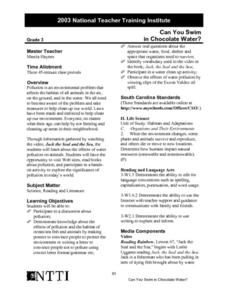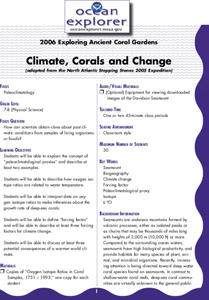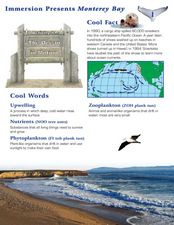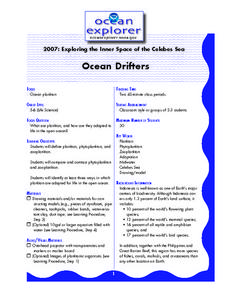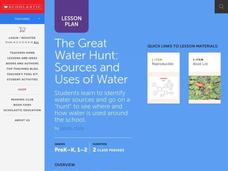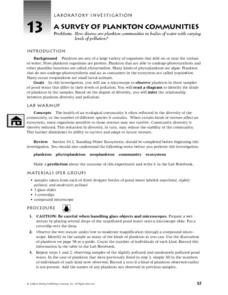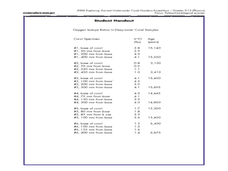Curated OER
Can You Swim in Chocolate Water?
Third graders discss water pollution and its affects on animals. They watch a demonstration using a plastic fish in a fish bowl in which various types of water pollution are illustrated.
Curated OER
Animal Movement in Water
Students explore oceanography by participating in field trip activities. In this fish characteristics lesson, students attend a trip to a local beach or reservoir and collect different specimens in order to examine them. Students...
Curated OER
The Ocean
Plant and animal life of the ocean is the focus of this science lesson plan. Young scientists sort a variety of seashells and explore why many sea animals have shells. They examine the shells, write journal entries highlighting the...
Polar Trec
Plankton Parents
Plankton are so abundant in the ocean they outweigh all of the animals in the sea. In this three day activity, groups discuss and become familiar with plankton, capture females, and look for egg production on day three.
NOAA
Climate, Corals and Change
Global warming isn't just an issue on land; deep ocean waters are also showing troubling signs. Young scientists learn more about deep water corals and the many recent discoveries researchers have made. Then they examine data related to...
Curated OER
Life on the Ocean Floor
Why would water 2700 meters deep suddenly become warmer? Explore this and other ocean floor discoveries through this reading response worksheet. Scholars read information about the organisms discovered by Alvin, a deep-sea submersible....
Curated OER
History's Thermometers
Ancient coral beds give scientists clues to past ocean temperatures in much the same way that tree rings indicate historical weather conditions. High school scientists examine coral oxygen isotope ratios and plot the data as a function...
Curated OER
Narrative vs. Expository Texts
Young scholars use examples of narrative and expository text to analyze and compare the two styles. Students read articles on life in Lesotho and Madagascar and use graphic organizers and discussion to compare them. Young scholars write...
Curated OER
Coral Reefs
Students research an inhabitant of a Caribbean coral reef using a list of common organisms that live on or near it. Students then write a description of their organism and draw a picture or a 3-D model of it. Eventually they all work...
Curated OER
Monterey Bay
Students read background information about Monterey Bay, California, and conduct related experiments. In this ocean in motion lesson, students read information about the location, wildlife, and characteristics of Monterey Bay. They...
NOAA
A Matter of Density
Larvae transportation on the New England seamounts is based on the density of the water. Scholars calculate density and graph salinity versus temperature to better understand the distribution of organisms in a water column. Discussions...
Consortium for Ocean Science Exploration and Engagement (COSEE)
Carbon Dioxide & Krill: Impacts
What effects do temperature and carbon dioxide levels have on the zooplankton of Antarctica? This concluding lesson plan in a short unit on climate change and the ocean helps environmental scientists answer these questions. After...
Scholastic
Study Jams! Aquatic Ecosystems
Mia's friends are fish-sitting while she is away on vacation. Zoe divulges to Sam that different animals need different habitats, and that there are both freshwater and saltwater ecosystems. Examples of the kinds of organisms found in...
Curated OER
Ocean Drifters
Students define terms, and identify three ways in which plankton are adapted for life in the open ocean. In this ocean drift lesson students design a planktonic organism.
Curated OER
The Water Cycle
Fifth graders examine the stages of the continuous water cycle that exists on Earth. They observe a water cycle model that is set up in the classroom and write descriptions of what they see. As a class, they discuss models of the water...
Curated OER
Reading Comprehension Skills: The Atlantic Ocean
In this reading comprehension worksheet, students read a 2-page article regarding the Atlantic Ocean. Students respond to 10 true or false questions regarding the article.
Curated OER
Life in the Ocean
In this ocean worksheet, students review the different life forms that can be found in the ocean and how these organisms are connected to each other. This worksheet has 12 short answer questions.
Curated OER
The Great Water Hunt
Students create a model of the land to water ratio in a large group and search for all the places water is used at their school while on a Great Water Hunt. They identify where water can be found and compare how much of world is covered...
Curated OER
Kure Waste Chase Game Lesson
Students work together to identify marine debris. They explain the effect of the debris on various ecosystems. They draw different types of ocean currents as well.
Curated OER
Design a Reef!
Middle schoolers explore coral reef ecosystems. In this ecosystems science lesson plan, students research coral reef ecosystems to determine the major functions the participating organisms must perform. Middle schoolers construct a...
Curated OER
The Intertidal Zone: Tide and How Creatures Survive
Young scholars explore oceanography by completing science worksheets. In this tide pools lesson, students discuss the forces of the tide pools, the animals that live within them, and the impact they have on the rest of the ocean. Young...
Curated OER
A Survey of Plankton Communities
In this biology worksheet, students identify and define the vocabulary terms listed and make a prediction about the outcomes of the experiment. Then they complete the chart of the observations of the plankton diversity in drops of pond...
Curated OER
How can deep-water corals be used to determine long-term patterns of climate change?
Students explore the concept of paleoclimatological proxies. In this paleoclimatological proxies lesson, students explain isotope ratios in deep water coral samples. Students write a paragraph about global climate change as it effects...
Wilderness Classroom
Ocean Life
Our oceans are composed of many complex relationships. Young oceanographers explore relationships between organisms, understand the world ocean's currents, and discover the effects of water pollution and how it behaves. There are three...


